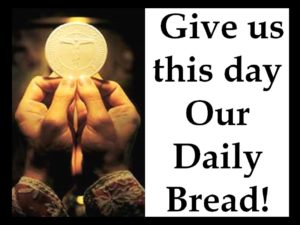2 KINGS 4:42-44; EPHESIANS 4:1-6; JOHN 6:1-15
 There is much in ordinary life that we take for granted, I suppose. We appreciate these only when there is a shortage. Then suddenly everyone scrambles for the remaining resources. Appalled at the wastefulness of their students, two elementary school teachers in Santa Cruz, California, planted a young sapling on the school’s campus and named it the “Free-Food Tree”. Rather than discard their uneaten or unwanted sandwiches, the children were encouraged to place them under the tree so that students who had lost their lunch or could not afford one could help themselves. Some children began to bring an extra sandwich from home so that they’d have one to put under the Free-Food Tree. Eventually, the supply of donated food was sufficient to nourish all the school’s hungry youngsters with enough left over to offer to the homeless who lived in the city park near the school. In addition to learning not to waste their share of this world’s goods, the students had their first encounter with hunger and began to understand what they could do to alleviate it. A valuable lesson indeed, because every hour 1,500 of this world’s children die of hunger or hunger-related causes, a fact that is hard to believe or accept.
There is much in ordinary life that we take for granted, I suppose. We appreciate these only when there is a shortage. Then suddenly everyone scrambles for the remaining resources. Appalled at the wastefulness of their students, two elementary school teachers in Santa Cruz, California, planted a young sapling on the school’s campus and named it the “Free-Food Tree”. Rather than discard their uneaten or unwanted sandwiches, the children were encouraged to place them under the tree so that students who had lost their lunch or could not afford one could help themselves. Some children began to bring an extra sandwich from home so that they’d have one to put under the Free-Food Tree. Eventually, the supply of donated food was sufficient to nourish all the school’s hungry youngsters with enough left over to offer to the homeless who lived in the city park near the school. In addition to learning not to waste their share of this world’s goods, the students had their first encounter with hunger and began to understand what they could do to alleviate it. A valuable lesson indeed, because every hour 1,500 of this world’s children die of hunger or hunger-related causes, a fact that is hard to believe or accept.
But there is another hunger which gnaws at the human heart; these also cry out for nourishment. This week and for the next three weeks, the gathered assembly is invited to consider these other hunger as well as the nourishment that God in all goodness and compassion, offers to satisfy them.
Through the various scriptural accounts of Elisha feeding 100 men, (2 Kgs 4); manna in the wilderness (Exod 16); Elijah being fed by the angel (1 Kgs 19); Wisdom preparing a feast and sending forth an invitation to all (Proverb 9); and of Jesus multiplying bread for the many (John 6), believers are reminded that God is attuned to and eager to satisfy every human hunger. In each of these events, however, those who ate their fill were also challenged to look beyond the gifts of nourishment to more intimately know and appreciate the Giver.
Karl Rahner (The Great Church Year, Crossroad Pub. Co., New York: 1994) once explained that the people in today’s gospel were drawn to Jesus, driven by a hunger for God. They followed Jesus into the wilderness because they were aware that their own lives were a wilderness; they hungered for the words Jesus spoke. They wanted more than their ordinary lives were able to offer them. But, while they were hungering for God, a physical hunger seized them. Hungering for God they found themselves hungering for earthly life. Then the situation turned strange.
In today’s Gospel, Jesus blesses bread/food. A large crowd of Galileans, impressed by the wonders or marvels of Jesus’ healing has followed him into the hills on the far side of the lake. Although searching for spiritual food, they found that they were physically exhausted and hungry. Jesus, whom they were following, to hear the words of life gave them earthly bread and fish. When they ate and had their fill, they wanted to make him king (6:15). What was offered as nourishment to sustain them in their search for God became a temptation, prompting them to covet the “free lunch” and to lose sight of its significance? As a result, Jesus fled from them. Rahner suggests that this is a parable of what constantly happens in the lives of individuals, particularly in our technological age.
God enables us to develop the technology so that we can have our earthly bread and to be able to multiply it to feed the great multitudes who live in the many wildernesses of this world. Technological advances should give us more time to seek for God’s bread and to satisfy our hunger for eternity. But we, like the people in today’s gospel are tempted by the miracle and technology becomes our God. And so God withdraws from us, not willing to become a part of our scheme.
Today’s readings remind us of the balance that must be struck. If we have been blessed with an abundance of earthly bread or with the technical capabilities to produce such an abundance, then these gifts are for sharing with the hungry. When physical hunger is satisfied, then we are free to attend to the deeper hunger, for love, mercy, forgiveness, companionship, peace and fulfilment. In satisfying these hunger for one another, we realize and sharpen our hunger for God who is always ready to satisfy the hungry heart.
Jesus challenges us as he did to Philip to be sensitive to the needs of others. As this sign is proclaimed today, Jesus poses his question to each of us. “Where shall we buy bread to satisfy the hungry today?” All who eat and are filled by the bread of life and who truly perceive the sign in faith. . . all who are gathered together by that sharing. . . all of us become responsible for one another as well as for those whose hungers have yet to be satisfied. If another hunger, it is I who must buy or make, beg or borrow bread. Then when he/she has been fed, it devolves upon us to satisfy his/her deeper hunger for the bread of life who is Jesus. Sharers in this bread will have eternal life. -Little Input from Patricia Datchuck and Dennis McBride.




Be the first to comment